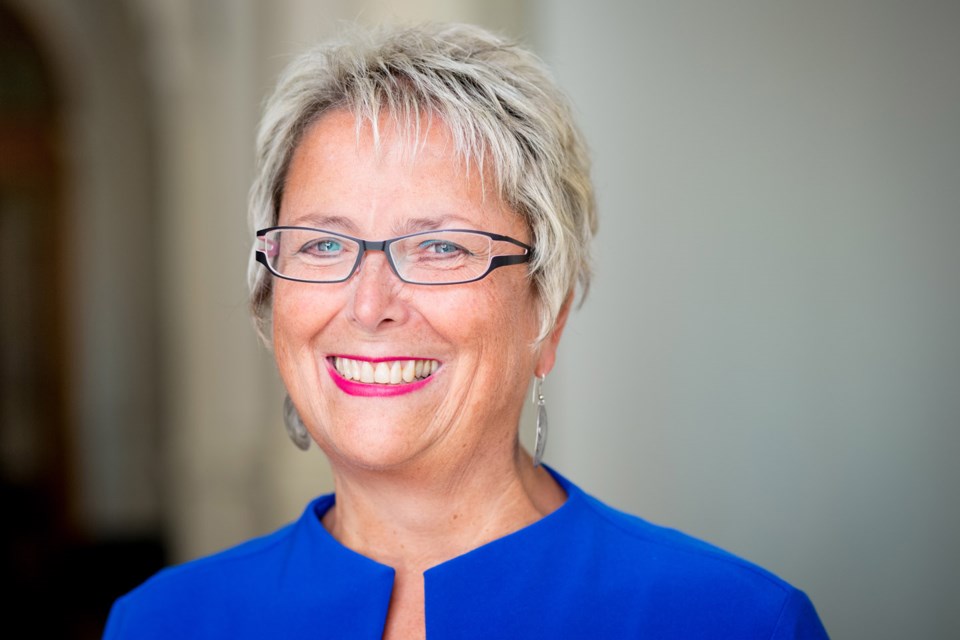To say Judy Darcy is proud of the 2018 B.C. budget is an understatement.
Housing and child care are the centrepieces of the provincial budget unveiled by the NDP government on Feb. 20.
“This is why I ran for office. This is why we are here. It’s the proudest moment, I have to say, since I was elected to represent New Westminster,” said New Westminster’s MLA. “This budget really does put people first, and this budget really is going to make a difference in the lives of a lot of people in New Westminster.”
The plan includes an investment of more than $1 billion over three years for childcare and a plan to create more than 22,000 child-care spaces across B.C. The NDP hasn’t introduced its promised universal child care program, but has taken steps to reduce child-care costs by up to $1,250 per month for families making less than $45,000 and to support 86,000 families annually by 2020/21.
“We are going to be making childcare far more affordable for families in New Westminster and for families that have an income of less than $45,000,” Darcy said. “It’s a bold step toward a universal program. We have said it’s going to take 10 years to build a fully universal child care program, but these are really bold steps in that direction. It is going to reduce costs for tens of thousands of families across the province.”
Darcy said the plan is “transformational” and is the first new social program introduced in B.C. in decades.
On the housing front, the government is taking a number of steps to address the housing crisis, such as initiatives to curb speculation in the B.C. housing market and construction of 114,000 affordable rental, non-profit, co-op and owner purchased housing units through various partnerships.
“It’s a 30-point plan,” Darcy said. “Our plan will curb speculation, it will crack down on tax fraud, it will support renters and it’s going to build a whole lot more affordable housing.”
A $400 renters rebate promised during the 2017 provincial election campaign isn’t in the cards at this time.
“The renters rebate isn’t in this. We are still discussing how to implement a number of pieces. This is a 30-point action plan – it’s not a 100-point action plan,” Darcy told the Record. “We will be doing some things in the short-term that provide relief for renters. These are significant. These are issues I have heard about in New West over and over again.”
According to Darcy, increases to rental assistance programs for low-income families and seniors will help more than 35,000 households across B.C. She said initiatives will be introduced to protect renters from renovictions and demovictions.
To address housing affordability and to curb speculation in the residential property market, the province is introducing a speculation tax, and increasing the foreign buyers’ tax from 15 to 20 per cent and expanding it to include more areas of the province. Some organizations, including the Urban Development Institute, have voiced concerns that the new housing tax increase won’t have a positive impact on affordability and will actually negatively impact local buyers and homeowners.
“It is about clamping down on speculators. It’s about dealing with condo flipping, presale flipping. It’s about speculation, whether that’s foreign or domestic,” Darcy said. “The overwhelming majority of people who are concerned about the housing crisis and are experts in this area said you need to take a number of different measures that deal with that. And that is what we are doing.”
Darcy is pleased the province is expanding Pharmacare coverage and eliminating MSP premiums for individuals.
“We are eliminating MSP premiums entirely and we are doing what other provinces have done, which is bringing in a payroll tax,” she said. “That will not affect small business. Small business will be exempt from that. A lot of families are still paying their own MSP.”
Some organizations, including the Canadian Taxpayers Federation, expressed concern the B.C. government is shifting a health tax burden onto employers.
“This is robbing Peter to pay Paul, and we worry that employees will suffer for it,” Kris Sims, B.C. director of the Canadian Taxpayers Federation, said in a press release. “It was good that the government committed to axing the unfair MSP health tax, but they are now pinning it on employers who will have to find that money somewhere. Employers don’t have a magical pot of money to hand to government, and they will do things like freezing wages, halting hiring and ceasing expansion. That punishes growth and innovation.”



